 Petzlover
Petzlover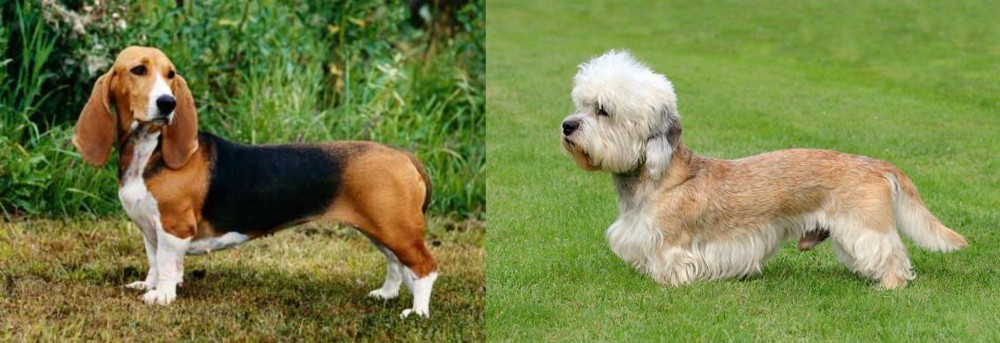 Basset Artesien Normand is originated from France but Dandie Dinmont Terrier is originated from United Kingdom. Basset Artesien Normand may grow 8 cm / 4 inches higher than Dandie Dinmont Terrier. Basset Artesien Normand may weigh 9 kg / 20 pounds more than Dandie Dinmont Terrier. Both Basset Artesien Normand and Dandie Dinmont Terrier has same life span. Both Basset Artesien Normand and Dandie Dinmont Terrier has same litter size. Basset Artesien Normand requires Low Maintenance. But Dandie Dinmont Terrier requires Moderate Maintenance
Basset Artesien Normand is originated from France but Dandie Dinmont Terrier is originated from United Kingdom. Basset Artesien Normand may grow 8 cm / 4 inches higher than Dandie Dinmont Terrier. Basset Artesien Normand may weigh 9 kg / 20 pounds more than Dandie Dinmont Terrier. Both Basset Artesien Normand and Dandie Dinmont Terrier has same life span. Both Basset Artesien Normand and Dandie Dinmont Terrier has same litter size. Basset Artesien Normand requires Low Maintenance. But Dandie Dinmont Terrier requires Moderate Maintenance
 The Basset Artesien Normand hails from Normandy, France. He was bred around the middle ages and was a popular breed with the royalty of France when they met for hunting with hounds. How the Basset was developed isn’t known, but in the 1800s the dog’s popularity grew, and Napoleon himself was a fan. With some people wanting hunting skills in their dog, others good looks and some wanting a heavier dog, the Basset Artesien Normand or the BAN emerged.
The Basset Artesien Normand hails from Normandy, France. He was bred around the middle ages and was a popular breed with the royalty of France when they met for hunting with hounds. How the Basset was developed isn’t known, but in the 1800s the dog’s popularity grew, and Napoleon himself was a fan. With some people wanting hunting skills in their dog, others good looks and some wanting a heavier dog, the Basset Artesien Normand or the BAN emerged.
Some people believe that the Basset came from a mix of French hounds crossed with smallish breeds such as Beagles and Dashshunds.The truth is that the Basset’s origin is up for debate, but the Basset Artesian Normand took over in popularity from the Basset Normand and the Basset Chien d’Artois. These dogs are now extinct.
The first record of Bassets in America came from the 1700’s when a number of Bassets were presented to George Washington as gifts. It is uncertain what type of Bassets they were, but quite likely they were Basset Artesian Normands. The breed club was established in 1910 and given its present name in 1924. The dog is also recognized by the United Kennel Club in the Scenthound group.
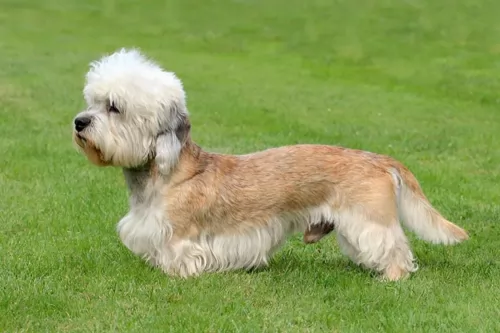 The rough coated Dandie Dinmont Terrier originates from Scotland. They were used centuries ago for hunting otters and badgers.
The rough coated Dandie Dinmont Terrier originates from Scotland. They were used centuries ago for hunting otters and badgers.
There are theories that exist that the dog is a cross between Scottish- and Skye Terriers while others believe there must be some Dachshund in the mix because of the long body of the Dandie Dinmont Terrier.
The Dandie Dinmont Terrier was first recorded as a distinct breed in the late 1600s. The British Dandie Dinmont Terrier Club was formed in 1875 while the American Kennel Club recognized the Dandie in 1886.
 The BAN is a small to medium sized dog, between 30 and 36 cm and weighing anything up to 20kg. He is low maintenance in terms of his short coat which is tri-colored – fawn, white with a black patch across the back. He has a long tail which is often held in an upright position. You can’t miss those long ears, which are a distinctive feature of this gentle, good-natured dog and which are low-set on the head. Add to that the dark, soulful eyes and you get a look that ‘wouldn’t hurt a fly.’
The BAN is a small to medium sized dog, between 30 and 36 cm and weighing anything up to 20kg. He is low maintenance in terms of his short coat which is tri-colored – fawn, white with a black patch across the back. He has a long tail which is often held in an upright position. You can’t miss those long ears, which are a distinctive feature of this gentle, good-natured dog and which are low-set on the head. Add to that the dark, soulful eyes and you get a look that ‘wouldn’t hurt a fly.’
The BAN is very similar to the regular Basset Hound but he is much slimmer. This is also because although he is a companion, he was at first a hunting canine, and is fit and muscular when fed the correct diet.
The Basset Artesien Normand is a friendly, affectionate dog, becoming a beloved pet of the family that he loves to be with. His gentle nature means that he won’t score high as a guard dog. He is gentle and affectionate with children in the home, and with some training and socialization he gets on well with other pets in the family. They’re fairly intelligent and you’ll be able to train him to carry out some important commands. As a hound, he tends to want to wander, and it is always a good idea to have him on a leash when out and about with him.
This breed of dog will need a good amount of exercise and other activities, even if it means climbing onto the couch and watching a movie with you. He can’t be left in the garden day after day on his own, and you’ll need to take him on daily walks and give him a game. Exercise is of particular importance for a dog like this, as he can easily put on weight and battle with back problems.
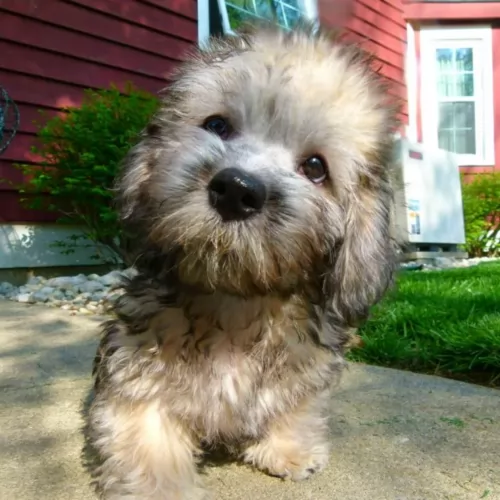 The Dandie Dinmont Terrier is a small dog who stands between 20 – 28cm at the withers and weighs between 8 and 11kg. He is recognizable by his fluffy head of hair.
The Dandie Dinmont Terrier is a small dog who stands between 20 – 28cm at the withers and weighs between 8 and 11kg. He is recognizable by his fluffy head of hair.
He actually has quite a unique look with his long body and slightly over-sized head. He has floppy ears and a long tail. His coat is quite unusual too in that it can be silky and long around the face, legs and belly, while the topcoat is fairly shortish and crisp. His coat color is fawn to brown or reddish. He isn’t a heavy shedder.
Known also as the Dandie, Charlie’s Hope Terrier, the Mustard and Pepper Terrier, the Dandie Dinmont makes an excellent family pet with his calm demeanor, being somewhat reserved around strangers.
He is an alert, intelligent little dog and will warn you of strangers coming into your space. He therefore makes a good watchdog. He is loving and loyal to his human family and will readily fit into life in the city or in the countryside.
They are good with children and pets but with his independent streak, he will require training and socialization if you want him to behave and be obedient.
 The Basset Artesien Normand is such a family friend with his docile personality. Short of stature, he has a keen sense of smell, much like the Bloodhound. With his short, smooth coat, he won’t require much from you in terms of grooming. His long ears, his sad eyes and his outward turned paws are all characteristics which endear him to dog lovers.
The Basset Artesien Normand is such a family friend with his docile personality. Short of stature, he has a keen sense of smell, much like the Bloodhound. With his short, smooth coat, he won’t require much from you in terms of grooming. His long ears, his sad eyes and his outward turned paws are all characteristics which endear him to dog lovers.
He doesn’t like to be left alone. This Basset is yours and he wants to be part of all the action in the house, and that includes meals. He has a hearty appetite, but you don’t want to be feeding him your scraps as he can put on weight quickly. This won’t be good for his health, and as a responsible pet owner, you need to be watching his weight.
Don’t forget his daily walk that he loves so much. Treat him with love and kindness and you’ll have yourself a happy, good-natured companion.
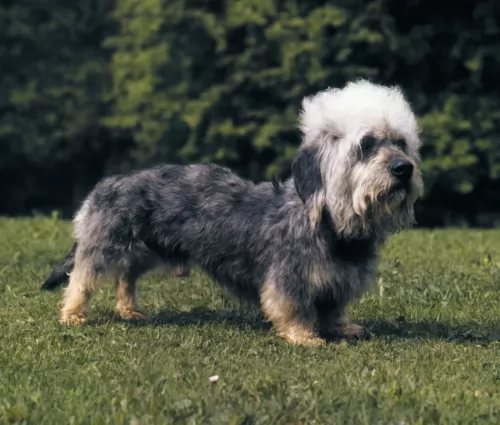 Your Dandie Dinmont is capable of being a wonderful companion. He loves spending time with his human family and is affectionate and loyal.
Your Dandie Dinmont is capable of being a wonderful companion. He loves spending time with his human family and is affectionate and loyal.
The small Dandie is able to fit into life in the city or country, just so long as he has his human family with him. Because he comes from Terrier dogs, he is no push-over though and he has an independent streak which will benefit from training and socialization.
Make sure you give this small dog of yours plenty of love and good care and you will find that you have a loyal, devoted friend in him.
 The Basset Artesian Normand is a fairly healthy breed and you can expect him to reach 15 years, although you have to bear in mind that this breed is susceptible to some common health defects. As already mentioned, these long-bodied, short-legged dogs are prone to back problems. Weight gain is common in these dogs and additional weight will aggravate your dog’s back problems.
The Basset Artesian Normand is a fairly healthy breed and you can expect him to reach 15 years, although you have to bear in mind that this breed is susceptible to some common health defects. As already mentioned, these long-bodied, short-legged dogs are prone to back problems. Weight gain is common in these dogs and additional weight will aggravate your dog’s back problems.
While hip dysplasia is a genetic disease found more commonly in large dog breeds, it can also affect smaller breeds like the Basset. Your dog may develop a different way of walking and running and he may even resist movement as he can experience stiffness and pain in the rear legs. Hip dysplasia is mostly an inherited condition. Proper diet and exercise can help with preventing the disease.
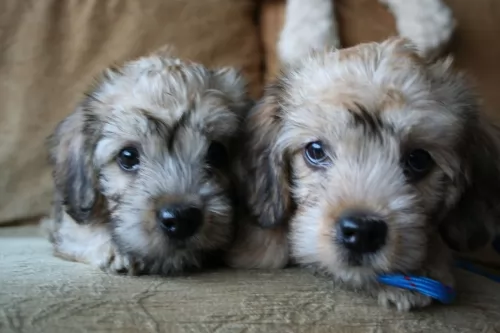 Your pet Dandie Dinmont is a robust little dog who, with good care, can live to be anything between 12 to 15 years of age.
Your pet Dandie Dinmont is a robust little dog who, with good care, can live to be anything between 12 to 15 years of age.
With every dog breed there will be health concerns, and these can include illnesses such as epilepsy as well as hypochondroplasia. All dogs have the potential to fall prey to health problems, and getting your pet from a reputable breeder can help to ensure you eliminate some of these diseases.
This small dog has a long body which means he can be affected by spinal problems. Genetics and body shape play a large role. Intervertebral disc disease is a condition where the cushioning discs between the vertebrae of the spinal column herniate into the spinal cord space. The discs press on the nerves and pain and paralysis can follow.
 The Basset Artesian Normand has a short, smooth coat and this will ensure that he is low maintenance. A regular brush twice a week will ensure you get rid of loose hairs.
The Basset Artesian Normand has a short, smooth coat and this will ensure that he is low maintenance. A regular brush twice a week will ensure you get rid of loose hairs.
Ear Infections - as is the case with long eared dogs, the Basset Artesian Normand is susceptible to ear infections. Check with your vet if you aren’t sure how to clean your dog’s ears so that you can prevent ear infections.
Brush your dog’s teeth about 2 or 3 times a week with special dog toothpaste- and brush. His nails will also need to be clipped regularly, more so if he doesn’t get to run on hard surfaces which wear the claws down.
You can speak to your veterinarian about wet- and dry dog foods and which type of food would suit your pet best. The type of food you give him, his age and his activity levels will be a guide on how to choose his food. Always make sure that a bowl of fresh, cool water is readily available to your 4-legged friend.
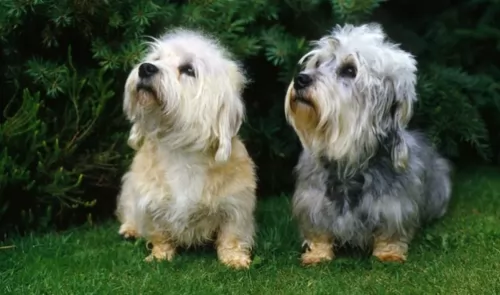 The Dandie doesn’t require as much exercise as some other dog breeds but you want to make sure he goes with you on your walks, or you play ball with him in the garden. You don’t want to see a small dog like this becoming obese as it can herald in a host of health problems.
The Dandie doesn’t require as much exercise as some other dog breeds but you want to make sure he goes with you on your walks, or you play ball with him in the garden. You don’t want to see a small dog like this becoming obese as it can herald in a host of health problems.
The Dandie Dinmont Terrier doesn’t shed a hang of a lot but still, you will need to brush him twice a week to get rid of those loose hairs. Also, the coat will require stripping twice a year. Some dog owners who prefer a low maintenance breed might not like knowing this, but it is a necessary part of his grooming. There are some dog owners who cut the hair rather, but then the texture of the coat will change. This is only important to know if you want to show your Dandie. Other Dandie owners take their pets to a professional groomer for clipping.
Because the Dandie has floppy ears and a lot of hair around the face and ears, you will need to check his ears for dirt and wax build-up as these can cause an ear infection. If you’re nervous to be going inside your dog’s ears, the vet or the dog groomer can show you how.
Also, little dogs like this are prone to tooth decay, and you will need to brush his teeth 2 or 3 times a week. This is because plaque and tartar buildup can cause mouth infections which contribute to other diseases within the body.